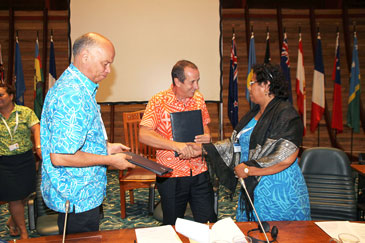
The European Union, the Secretariat of the Pacific Community (SPC) and the Government of Kiribati yesterday formalised a 3.3 Million Euro (4.75 Million AUD) partnership that is expected to increase access to safe water and sanitation in 35 villages in Kiribati's Gilbert Islands.
Funded by the European Union and to be implemented by SPC, the Water and Sanitation in Kiribati Outer Islands project will focus on improving water and sanitation infrastructure on the 16 islands of Kiribati's Gilbert group. It will also improve management of water and sanitation at the community level.
On signing the agreement, the EU’s Ambassador to the Pacific, Mr Andrew Jacobs highlighted the importance of effective partnerships to support local communities when pursuing development goals.
‘The European Union, SPC and Kiribati have forged a fruitful partnership over the years. This project is yet another example thereof. This project also reflects the EU's continued commitment to support the government of Kiribati and its people in their efforts to attain the Millennium Development Goals [MDGs], which are due for assessment in 2015,’ he said.
‘Meeting targets such as the MDGs requires hard work at all levels and the success of this endeavour is only possible with the continued commitment and participation of communities in Kiribati,’ he added.
Kiribati’s High Commissioner in Fiji, Ms Reteta Rimon welcomed the support of the European Union towards Kiribati's efforts to build sustainable solutions to their water and sanitation challenges. ‘As far as water is concerned, the people of the outer Gilbert Islands live in a harsh environment, and this contributes to the disparity that exists between local socio-economic conditions and those in the capital, South Tarawa,’ she said.
SPC Director-General Dr Colin Tukuitonga said that the main aim of the project was to improve human health and reduce poverty. ‘SPC recognises the critical role that access to safe water and sanitation plays in supporting healthy and sustainable Pacific communities, but achieving this can be a real challenge in atoll environments,’ he said. ‘We’re delighted that the EU also recognises these important links and is partnering with Kiribati and SPC to support tangible improvements on the ground.’
Over the next four years, the project will work with local communities to increase access to clean water and safe sanitation across all 16 islands of the Gilbert Group, through the demonstration of technologies such as groundwater pumping and reticulation, protection of wells from pollution and improved sanitation.
For further information, contact:
SPC CONTACT, Rhonda Robinson, Deputy Director Water and Sanitation Programme, Tel: +679 338 1377 Ext: 36259, Email:
This e-mail address is being protected from spambots. You need JavaScript enabled to view it
EU CONTACT, Myron Williams, Delegation of the European Union for the Pacific, Suva, Fiji. Tel: 3313-633, Email:
This e-mail address is being protected from spambots. You need JavaScript enabled to view it





